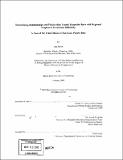Determining relationships and policies that transit properties have with regional employers to increase ridership : a case of the Tren Urbano in San Juan, Puerto Rico
Author(s)
Parikh, Ami, 1976-
DownloadFull printable version (10.66Mb)
Other Contributors
Massachusetts Institute of Technology. Dept. of Urban Studies and Planning.
Advisor
Joseph Coughlin.
Terms of use
Metadata
Show full item recordAbstract
Employer-based transportation demand management measures are increasingly seen by transportation planners as one of the potential means to manage the demand for private transport. These measures are essentially a comprehensive package of incentives and disincentives targeted at employees to encourage high occupancy vehicle commute as opposed to single occupancy vehicle travel. This research examines the composition of employer transportation plans and their application with respect to encouraging public transportation ridership. Drawing on the experiences of employer transportation plans in three cities - St. Louis, Missouri, San Diego, California and the Longwood Medical Area, Boston, Massachusetts, this research argues that there are a number of preconditions which will make an employer transportation plan more likely to succeed in its aim of reducing the number of people who drive alone to work. These include providing strong management support to the program, providing adequate resources to the program - both financial and other, public-private coalition development whereby employers can partner with transit properties to build system ridership by attracting choice riders, an aggressive employee transportation coordinator and providing appropriate incentives and disincentives to employees. Other key considerations are the availability of parking, the cost of parking and access to a high-quality public transportation system. Finally, this thesis recommends an implementation strategy for establishing employer transportation plans in San Juan, Puerto Rico. In response to the increasing traffic congestion in San Juan, Puerto Rico, a mass transit system, the Tren Urbano, is currently being constructed. There is a need to resort to travel demand management measures in San Juan because of severe traffic congestion. The arrival of Tren Urbano provides many opportunities for employers to partner with regional transportation service providers in building the transit system ridership by implementing employer supported travel demand management measures at the worksite. Taking the examples of two large employers, the Banco Popular and the Centro Medico, in San Juan, this research outlines an execution strategy for employer transportation plans in San Juan.
Description
Thesis (S.M.)--Massachusetts Institute of Technology, Dept. of Urban Studies and Planning, 2000. Includes bibliographical references (leaves 126-128).
Date issued
2000Department
Massachusetts Institute of Technology. Department of Urban Studies and PlanningPublisher
Massachusetts Institute of Technology
Keywords
Urban Studies and Planning.